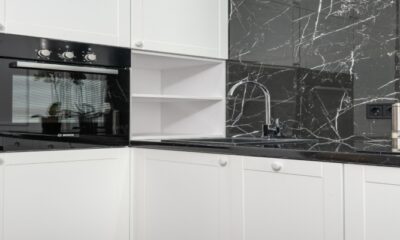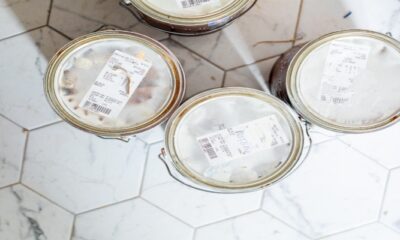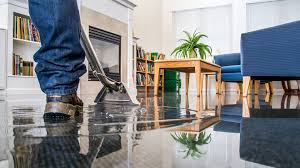Home Improvement
Prevent Your Drain From Clogging With These Simple Tips

There are a plethora of drains available in the home from the kitchen drain to the bathroom drain and the toilet drain. If anyone of these drains gets clogged, however, wastewater can get backed up and cause serious problems.
With a clogged drain, some issues that you’ll encounter include slow drainage of water, an overflowing toilet, and foul smells. Chances are you’ll also need to hire a professional to assist with unclogging the drain. To prevent such issues from occurring, there are some steps you can take to avoid a clogged drain and keep your drains in pristine condition.
Don’t dispose of solids in the sink
While it’s convenient to throw fruit cuttings, grains, seeds, and other food remnants into the kitchen sink, it’ll clog up the pipes in your sink. These solids are too large to be flushed down and will get trapped and accumulate in your pipes.
Be careful of what you flush down the toilet
Using too much toilet paper can lead to blockage as drains are built to handle wastewater and not large amounts of toilet paper. If you’re using multi-ply toilet paper, try to use one piece at a time and avoid bunching it up. You should also never throw paper towels or other personal care items into the toilet as it’ll clog up the pipe.
Don’t pour oil and grease into the kitchen sink
While oil and grease may seem like a liquid substance when you first pour it down the drain, it’ll end up solidifying and can cause clogs. The best way to dispose of oil and grease is to allow it to cool before tossing it in your regular trash.
Purchase a gutter guard
Debris such as leaves and twigs can get caught in your gutters. If not cleared, it can lead to blockage of the downpipe. To prevent a blockage from occurring, you can purchase a gutter guard as these nifty items can catch different kinds of debris from leaves to sediments.
Use a bacterial drain cleaner
You’ll have to be careful with this one as some drain cleaners have corrosive substances that can cause harm to pipes. There are, however, some bacterial drain cleaners that’ll help with breaking down organic matter in your drains. You can purchase these in granular or liquid form with each package lasting for several months.
Don’t rinse any cement or grout down the drain
If you enjoy doing DIY projects at home, you must never rinse any joint compounds down the drain as it can harden once it sets and clog up your pipes. Instead, wait until the materials settle out before decanting the water in your yard and dumping any remaining sludge in the trash.
Other quick tips
Here are some other quick tips for preventing clogged drains:
- Never dispose of solid waste or grease down the drains. You should also purchase a strainer or mesh screen that’ll help with catching hair and any other items that could potentially clog up your drain.
- If you’re not keen on using a bacterial drain cleaner, the next best option is to get a professional plumbing service to take a look at your drain and clean it once a year. Yous should also get your gutters, storm pipes, and downpipes cleaned before and after a storm season.
- When cleaning your clothes, try to use less washing powder as it can solidify in the pipes if used in an excessive amount.
Dealing with a clogged pipe
If you’ve already got a clogged pipe at home, the best thing to do is call a professional plumbing service to assist you with unclogging the pipe. While it may be tempting to troubleshoot the issue on your own, it could cause more harm than good.
Professional plumbers have the expertise to rectify the issue swiftly and can also give you some pointers on preventing a similar problem from happening again.
-

 Press Release4 days ago
Press Release4 days agoClinical Trials Market Set for Robust Growth, Driven by Drug Development Surge and Digital Innovation
-

 Press Release5 days ago
Press Release5 days agoFill-Finish Pharmaceutical Contract Manufacturing Market Expected to Flourish Amid Biopharmaceutical Boom and Global Outsourcing Trend by 2035
-

 Business6 days ago
Business6 days agoHow Managed IT Solutions Help Small Teams Compete at Enterprise Scale
-

 Press Release5 days ago
Press Release5 days agoGreen Bio Chemicals Market Poised for Sustainable Growth amidst Global Shift to Eco-Friendly Alternatives by 2035
-

 Press Release5 days ago
Press Release5 days agoIndustrial Boiler Market Expected to Surpass USD 24.4 Billion by 2035 Amid Growing Demand for Energy Efficiency and Industrialization
-

 Press Release5 days ago
Press Release5 days agoPreventive Vaccines Market to Witness Strong Growth by 2035
-

 Press Release5 days ago
Press Release5 days agoPet Food Nutraceutical Market Set for Robust Expansion Amid Rising Demand for Pet Wellness by 2035
-

 Press Release4 days ago
Press Release4 days agoWaterproof Structural Adhesives Market: A Comprehensive Study Towards USD 10.3 Billion in 2035


























